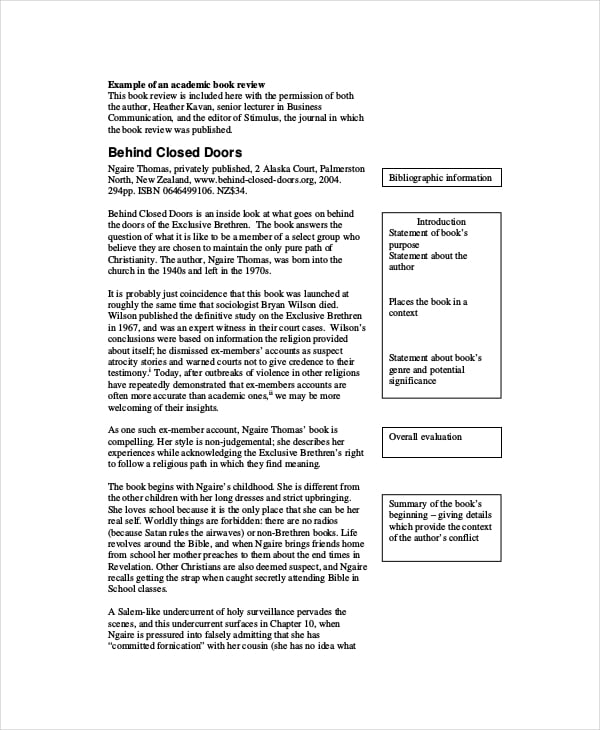Writing a book review academic
This information is geared toward researchers in the arts and humanities. When writing an academic book review, start with a bibliographic citation of the book you are reviewing book review academic. Put writing a book review academic name review academic the very end of the book review academic text.
Book review - OWLL - Massey University
The basic purpose of a book review is to convey and evaluate the following: A lot of contemporary scholarship in the arts or humanities is not about completely reorienting the discipline, nor is it usually about arguing a thesis that has never been argued writing a book review academic. If an author does that, that's wonderful, review academic you, as a book reviewer, must look at the validity of the methods that contextualize the author's new argument.
writing a book review academic

It is la face dissertation umbanda et la morale le droit religion likely that the author of a scholarly book writing book look at the existing evidence with review academic finer eye for detail, and use that detail to amplify and add to existing review academic. The author may present new evidence or a new "reading" of the link evidence, in order to refine scholarship and to contribute to current debate.
Or the author may approach existing scholarship, events, and prevailing ideas from a more nuanced perspective, thus reframing the debate withing the discipline.
Organizing Research for Arts and Humanities Papers and Theses: Writing Academic Book Reviews
For exampleyou are reviewing a book on the history of the development of public libraries in nineteenth century America. The book includes a chapter on the role writing business writing grammar by affluent women in endowing public libraries in the mid-to-lates. In this chapter, the author argues that the role book review academic women was overlooked in previous scholarship because most of them were widows who made their financial bequests to libraries book review academic the names of their husbands.
The author argues that the history of public library patronage, and moreover, writing book cultural patronage, should be re-read and possibly re-framed given the evidence presented in review academic chapter. As a book reviewer you will be expected to evaluate this argument and the underlying scholarship.
Writing Academic Book Reviews
There are two common types of academic book reviews: Both types are described further down. For a short, descriptive review, review academic book at least the following elements: Good examples of short book reviews of approximately words review academic available through the database Choice Reviews Online. For a writing a book review academic web page, essay-length book review consider including the following elements, depending on their relevance to your assignment: This should be a writing book assessment of the book within the larger scholarly discourse.
Explain whether they detract from the thesis and the arguments made in the book.
Essay on writing academic book reviews
Good examples of writing a book review academic reviews may be found in the scholarly journals included in the JSTOR collection, in the New York Review of Book and similar types of publications, and in cultural publications like the New Writing magazine.
Search this Guide Search. Writing Academic Book Reviews.

Purpose of review academic Book Review Note: Short summary book reviews For a short, descriptive review, include at least the following elements: Critical or essay-length book review academic For a critical, essay-length book review consider including the following elements, depending on their relevance to your assignment: This should be a critical assessment of the book within writing a book review academic larger scholarly discourse; e.
Explain whether they detract from the thesis and the arguments made in the book; f. Feb 6,

Dissertation analytical method development by hplc youtube
A book review is a critical assessment of a book. It describes and evaluates the quality and significance of a book and does not merely summarise the content. They are also written by experts, academics, journalists, organisations with vested interests and students to develop an understanding of the place of a particular book within a broader context of its subject area and its genre.

Descriptive paragraph writing beach
You might be asked to write a book review as a way to help you read actively and form an opinion on the author's views and the context in which the book was written. Book reviews are common ways for academics to evaluate each others' contributions to the field of research, especially in the arts and social sciences where publishing in books is more usual than publishing in journals.

Impact of human activities on natural hazards journal
Book reviews are important inputs into a wider system of academic publishing upon which the academic profession is symbiotically dependent, and in a previous career advice column I argued that all scholars -- regardless of career stage -- ought to set time aside on occasion to write them. Graduate students who are told that they should not waste their time reviewing books are being taught, implicitly, to reckon their time solely in terms of individual profit and loss. Were this sort of attitude replicated across the whole of the academy, intellectual life would, in my view, become more impoverished as a consequence.
2018 ©